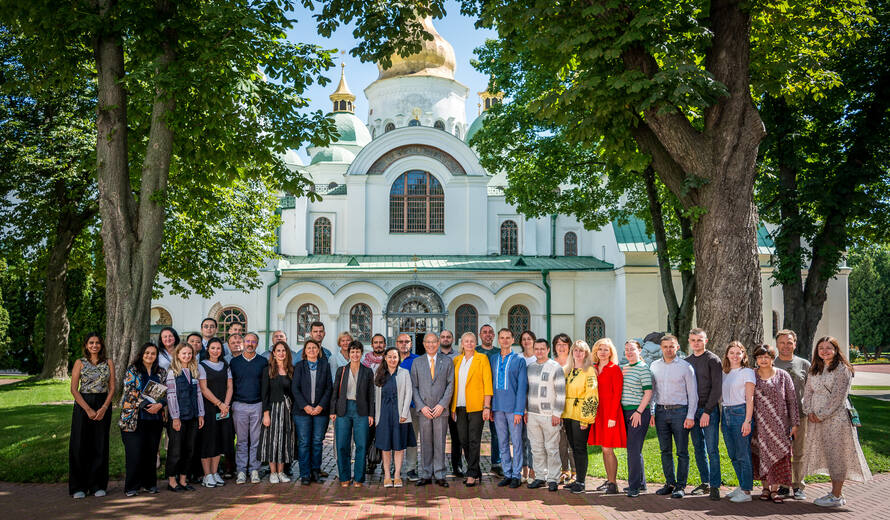UNESCO trains managers of World Heritage sites in Ukraine in disaster risk reduction
From 26 to 30 July 2023, UNESCO organized an intensive training course for more than 20 cultural heritage professionals from eight regions of Ukraine, including the cities of Odesa, Kyiv and L’viv, threatened by increasingly frequent attacks.
With the support of Japan, the in-person training aimed to strengthen the knowledge and expertise of Ukrainian heritage professionals in disaster risk reduction, emergency preparedness, as well as advanced documentation on the state of conservation of cultural heritage sites.
UNESCO joined forces with two of the Advisory Bodies to the World Heritage Committee, the International Council on Monuments and Sites (ICOMOS) and the International Centre for the Study of the Preservation and Restoration of Cultural Property (ICCROM), along with the Ministry of Culture and Information Policy of Ukraine.
When we ask ourselves in what way, how exactly to act, and what it means to be more active, very often we don't have the answers to these questions, and so it seems to me that the best thing we can do is to come together to assimilate and integrate the best international practices of our times.
Kateryna Chuyeva, Deputy Minister of Culture and Information Policy of Ukraine, during the official opening of the training workshop on July 26, 2023 © UNESCO / Yuriy Yurchenko
Through theoretical and practical modules, the Ukrainian heritage professionals acquired the skills and knowledge necessary to proactively reduce the risks to heritage. Among other things, participants received training in the basics of photogrammetry and laser scanning, which is essential for identifying the main needs in terms of documenting the state of conservation of the properties for which they are responsible. The National Conservation Area ‘Saint-Sophia of Kyiv’ welcomed the trainees to apply these documentation techniques to a site as symbolic as this major component of the World Heritage property ‘Kyiv: Saint-Sophia Cathedral and Related Monastic Buildings, Kyiv-Pechersk Lavra’.
In times of war, first aid skills for cultural heritage become essential. Interactive learning sessions including lectures, role-playing, group discussions and tabletop exercises enabled participants to carry out multi-hazard risk assessments and design a systematic emergency response to secure heritage and people, following the most recurrent critical incidents in today’s context, with the ultimate aim of minimising irreversible damage.
Participants exchanging during a group exercise
© UNESCO / Yuriy Yurchenko
An important outcome of this on-site training has been to strengthening communication between World Heritage sites managers coming from the different regions. In addition to learning, we have also shared experience; and this has allowed us to identify common risks on cultural sites of each region.
Oleh Handyn, Head of the Department of the Historical Environment Protection of L'viv City Council, during the training workshop from 26 to 30 July 2023
© UNESCO / Yuriy Yurchenko
This workshop played a crucial role in establishing a network of trained and committed professionals in Ukraine who will effectively manage the threats to heritage throughout the country. In line with its mandate from the Executive Board, UNESCO remains committed to preserving Ukraine's rich cultural heritage from the impact of war and to helping Ukrainian professionals work closely with national, regional and international partners.
Other activities as part of this project will unfold over the coming months in partnership with ICOMOS and ICCROM, so stay tuned.

